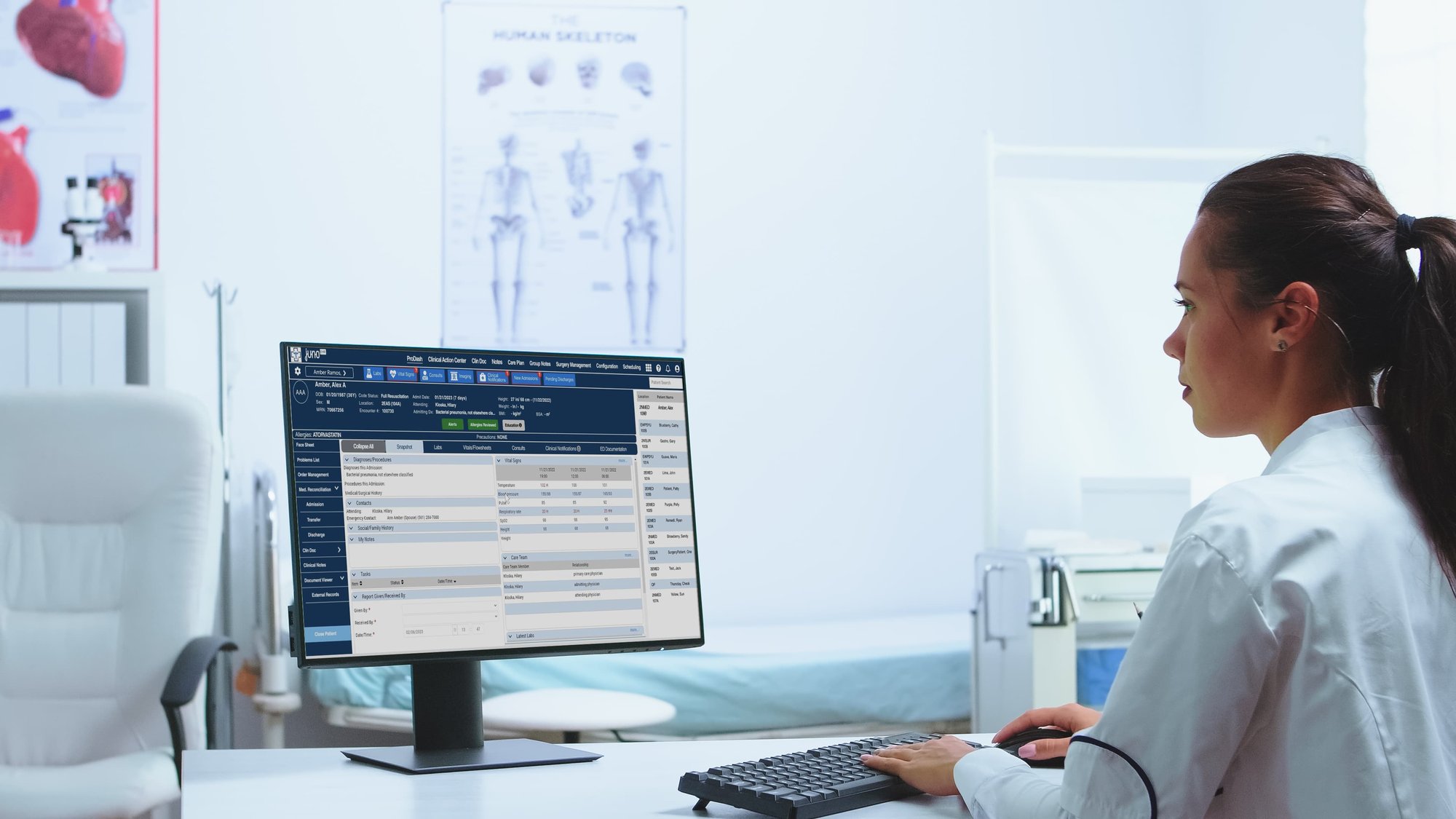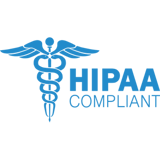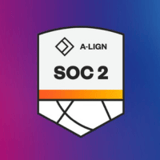Supporting Clinical Teams to Improve Patient Outcomes
Healthcare software built to reduce workloads with personalized workflows, eliminate care gaps, and reduce clinician burnout with an EHR built BY clinicians FOR clinicians.

The Right EHR Drives Employee Experience and Patient Care

Alleviate Clinician Workloads
With a solution that emphasizes productivity and efficiency, you can streamline tasks, processes, and workflows in innovative ways. The result? Less burnout and more time to focus on patients.
Elevate Patient Care
Juno Health offers solutions—designed BY clinicians, FOR clinicians—devoted to improving patient care. Achieve the best health outcomes with an EHR partner who solves the most significant care delivery challenges.
Explore our e-book, How Clinical Leaders Get a Seat at the Table for Tech Decisions
Save with a Personalized Cloud EHR Implementation Tailored to Your Needs
.jpeg?width=2000&name=AdobeStock_617889061%20(1).jpeg)
Our Solutions Fit Your Budget and Meet Performance Goals
Using an ineffective EHR can have lasting financial and operational effects. If a workflow doesn't align, the team has to create a workaround, which is a recipe for burnout. And if something goes wrong, you have to wait for the vendor to fix it, which is costly and impedes care. You need an EHR implementation that doesn’t break the bank but still aligns with clinician workflows and the facility's long-term goals and objectives.
Juno EHR Delivers Long-Term Savings and Streamlines Operations
Traditional EHR implementation can be costly thanks to setup and maintenance. Cloud-based EHRs provide valuable savings.
Juno EHR’s cloud-based infrastructure means you don’t need to worry about in-house IT staff and data storage. And you can put the money you save right back into improving health equity and care quality.
- Reduce paper-related expenses and make medical decisions by sharing the right information at the right time via APIs.
- Make resources and funds available to improve operational efficiency and service delivery.
- Generate detailed reports to uncover ROI and identify gaps to improve patient care.
The right EHR solution works wonders, helping healthcare facilities operate more efficiently—and increasing revenue and optimizing resource utilization along the way.
Check Out Juno’s Clinical Action Center
Built-In EHR Personalization and Compliance Solutions for Now and for the Future

Juno Health Is Built for Modern EHR Compliance
Stay in check at all times. Juno EHR is built with today’s compliance standards and regulations in mind, integrating real-time updates and customizable clinical guidelines powered by machine learning, so you always know your facility is on top of things.
And to help even more, Juno’s EHR generates detailed reports, assessing your regulation compliance. Lift the reporting burden off your shoulders with an EHR configuration designed to both handle this and identify quality improvement initiatives your facility can act on.
Keeping Up with Evolving Medical Policies & Regulations
Juno EHR is built with EHR compliance standards in mind, so you can check all the boxes right out of the gate:
But we know things are always changing. That’s why Juno Health acts as a long-term partner to accommodate future standards. Our EHR is constantly updated with the latest medical policies, regulations, and compliance standards.
That doesn’t mean compliance is completely restrictive. As your partner, Juno provides flexibility to personalize the solution to your healthcare system’s needs and help you easily scale into specialty care arenas. That means if your facility is focused on maternity, cardio, or another specialty, Juno’s EHR can be completely personalized and scaled for this.
Ready to Get Started? Get a Demo
Simplifying EHR Implementation
.jpeg?width=2000&name=AdobeStock_434377686%20(1).jpeg)
Overcome EHR Implementation and Training Hurdles
EHR adoption and implementation don’t have to be difficult! Juno Health is there from day one and offers continued training to help lower the learning curve, get everyone on the same page, and ensure you get the most from your investment.
Juno Overcomes Six EHR Implementation Challenges
What’s your biggest hangup in getting a new solution up and running? Juno approaches every implementation from several angles to ensure successful EHR adoption:
- Consultation and planning to understand your healthcare organization's specific needs and workflows. We work closely with leadership and IT teams to plan your implementation.
- Personalization to tailor your implementation to your specific needs. We’ll help you save time managing records, provide support for back-office initiatives, and facilitate care coordination. The easy-to-use interface helps you get information with fewer clicks and streamline workflows to get more done.
- Data migration to transition from paper-based records or another EHR system. Juno Health migrates existing patient data into your new Juno EHR system so you don’t miss anything.
- Training and education to get up to speed quickly. Juno Health provides training—available either on-site or online—to ensure successful implementation and full EHR adoption. And because the system interface is similar across roles, team members can easily help one another, too!
- Support and assistance to get ongoing support during and after your EHR implementation. We help you learn your new EHR faster by giving you access to a team that understands you’re not a technology organization. We’re always there to:
- Troubleshoot issues
- Answer questions
- Solve challenges
- Integration with existing systems to ensure that Juno EHR works effectively with all your moving pieces, such as billing, laboratory, or pharmacy systems. Our technology is built to enable scaling too, so you can always come back and integrate new tools.
Ready to Shift Gears? Book a Demo
Improve Workflow Management
.jpeg?width=2000&name=AdobeStock_639076788%20(1).jpeg)
Eliminate Clinician Workflow Challenges
Don’t let quality suffer. Your patients are No. 1, but so many unknowns can disrupt workflows and impact their care, including:
- System unavailability: System downtime prevents healthcare providers from accessing patient information.
- User interface and usability: Non-intuitive EHR interfaces create frustration and reduce productivity.
- Data entry and documentation: Inputting information requires too much time inside inefficient systems.
- Interoperability: Different EHR systems and vendors use distinct data formats and standards that interfere with data sharing and care coordination.
- Errors and data integrity: Using EHR systems improperly—such as entering data incorrectly or transferring incorrect information between records—can introduce errors and even harm patient safety.
Juno Optimizes Clinician Workflows
When you have a system that aligns with your facility's needs, you'll be on your way to achieving better processes, improving EHR workflows, and elevating patient care. Our EHR offers personalized templates, automated workflows, and user-friendly interfaces to ease your administrative burden and enhance staff productivity. Take time back to focus on patient care and satisfaction with an EHR that:
- Identifies and eliminates care gaps.
- Generates actionable reporting and analytics.
- Enables you to implement targeted interventions and monitor treatment plans.
Learn more about intentionally improving clinician workflows—read our Meaningful EHR Usability whitepaper.
Evaluating the Right EHR System

How to Audit Your Current System
Think it’s time to make a move to a new EHR system? These are a few of the signs you need a new solution:
- Your current solutions aren’t personalized, and you have to meet the needs of your specialty—whether that’s primary care, OB-GYN, or something else.
- Your current tool set lacks vendor support, and you need a solution that bundles onboarding, training, and support to shorten the learning curve, get quick answers to questions, and obtain ongoing support.
- Your current EHR doesn’t provide interoperability, and you need a solution that can share information between systems—old to new EHR, billing, and so on—while providing flexibility to integrate up-and-coming tools.
How to Evaluate EHR Vendors
In a sea of options, it’s tough to catch that prized fish. You need to know how to choose an EHR system—and it really comes down to features and capabilities. Ask yourself these important questions as you consider individual options:
- Does this solution provide adequate functionality?
- Can it integrate across operations?
- Will it give access to training materials and support staff?
- Does this solution have options for on-premises or cloud deployment?
- Can it generate reporting to adhere to government standards?
Related Resources
PIONEERS IN HEALTHCARE INNOVATION
0 +
0 +
0 +
0
FAQs
Electronic health records (EHRs) can help by improving quality of care, patient outcomes, and safety. Such solutions do so by providing a holistic view of overall health, resulting in better diagnoses and lifetime treatment. Benefits include:
Improved Access to Patient Records
EHRs provide convenient access to patient records, resulting in more efficient care.
Reduced Medication Errors
EHRs can limit medication mistakes and unnecessary investigations.
Improved Communication
EHRs can facilitate communication and enhance interactions among primary care providers, patients, and other providers.
Reduced Duplicate Tests
EHRs can ensure tests aren’t unnecessarily performed again, improving overall efficiency.
Better Coordination of Care
EHRs can help clinicians coordinate and track patient care across practices and facilities.
Secure Health Information
EHRs can make it harder for health information to be stolen or tampered with because they are protected by encryption services and robust password systems.
EHRs must be compatible with clinical workflows to ensure a smooth experience for clinicians and patients, to minimize errors and complications, and to ensure high-quality care. If an EHR is not compatible and interoperable with other software systems and environments, it can significantly hinder patient care. For example, if the system network connection fails, patient records will become unavailable. Automating workflows that involve the handling of EHRs can increase staff efficiency, reduce costly errors, improve interoperability, generate better patient outcomes, and increase revenue for healthcare institutions.
EHRs are helpful because they can alert you to potential errors, provide reminders for preventive care, improve diagnoses, and assist with treatment plans.
You can also use clinical parameters (e.g., vital signs, test results) within the EHR to create alerts or even trigger predetermined orders or order sets, diagnostic and therapeutic bundles, or clinical pathways.
EHRs improve diagnoses, reduce medical errors, and support better patient outcomes because they provide a full view of each patient’s medical history. As a result, it’s easier for clinicians to personalize treatment recommendations—including preventive care—and discuss patient needs across care teams. With all the tools required for high-quality care, EHRs ensure better patient experiences and can even provide patients with access to their medical details, enabling them to manage their own health.
EHRs are designed to help, not hinder, medical facilities. However, rolling out a new system can be challenging—whether it’s because of changes to established workflows or the cost of the solution. Often, facilities struggle because staff lacks technical experience, is resistant to adopting the solution, and requires additional training.
EHRs can help prevent medical errors both by helping staff take key actions based on the information stored and by automating actions to reduce human error. For instance, the system can trigger alerts for potential drug interactions and/or ensure that the right medication is prescribed to the right patient. EHRs can also improve patient safety by notifying primary care providers to schedule follow-up appointments.
EHRs enable physicians to achieve their business goals. Solutions like this avoid duplicate testing, as well as unnecessary paperwork—and their associated costs. As a result, clinicians spend less time on charting and recording information and can focus on patient care while gaining easier access to patient information.
EHRs can be limited by interoperability issues. When systems can’t talk to each other, they restrict information access, compromising patient safety, quality of care, and information management—and can even lead to patient harm. But interoperable EHR solutions enable better workflows and allow data transfer among EHR systems and healthcare stakeholders.
By clinicians, for clinicians
Built just for you. Transform the way you deliver exceptional patient care. Speak with a member of our team today to learn how Juno Health’s EHR solutions can help.


.jpeg?width=160&height=160&name=AdobeStock_181643658%20(1).jpeg)





